| Today, China has a Ministry of Foreign Affairs with general responsibility for relations with foreign nations, including the drafting and enforcement of treaties.
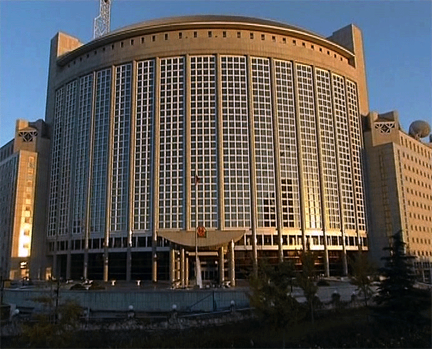
|
|
Chinese Ministry of Foreign Affairs Building.
(Source: http://www.fmprc.gov.cn/chn/klzcc/zccdmt/dmtzjwjb/W020040811512458443288.gif).
Treaties negotiated by the Ministry Of Foreign Affairs first have to be ratified by the People’s Congress or the Standing Committee of the Congress. There are many colleges and institutes in China responsible for training those who take up professions relating to foreign affairs. Professionals who work on treaties within this ministry likely would have been trained in one of several academic specializations, including law, international relations, international economics, and foreign languages. This is similar to academic training of foreign personnel in the United States.
The language of diplomacy has changed over the decades. Chinese is one of the six official languages for intergovernmental meetings and documents at the United Nations, along with Arabic, English, French, Russian, and Spanish. Speakers at the press conference of the Ministry of Foreign Affairs use Chinese rather than English to address questions. In 1979, the International Standard Organization passed a resolution adopting Hanyu Pinyin (implemented by the government of China in 1958) as the international standard for Chinese romanization to replace the Wade-Giles romanization in English language publications. Today, a standardized test in Chinese (the Chinese Proficiency Test) has been administered internationally, and 300,000 people from 120 countries took the test for employment qualification and university enrollment. Such efforts promote an identity of political and cultural autonomy departing from the artifact of China’s colonial past.
China is playing an increasing role in world affairs. In the late 1990s, the People’s Republic negotiated Hong Kong’s return to China in 1997 from its former status as a crown colony of Britain.
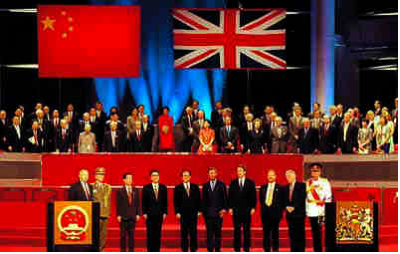
|
|
Ceremony for the handover of Hong Kong to China.
(Source: http://www.zj.xinhuanet.com/tail/2003-11/26/xin_8cb4866b608e4783a88c24bcd8c4ac78_s.jpg).
Two years later, China reclaimed Macao, formerly governed by the Portuguese. The return of both colonies resulted from the term leases within the treaties originally concluded by the Europeans and the Qing authorities and from subsequent negotiations. The Treaty of Nanjing (1842) had granted to Britain a hundred-year lease of the territories in Hong Kong, whereas the Portuguese had governed Macao as an informal colony since the seventeenth century and had not obtained formal treaty arrangement with the Qing until the signing of the Sino-Portuguese treaties in 1887.
China’s entry into the World Trade Organization (WTO), the global watchdog that enforces freer trade in goods and services, is the most important diplomatic move in its recent history. At the conclusion of 15 years of negotiation, China’s entry brought a market of 1.3 billion people into the global trading system, which calls for a society more open to the outside intercourse, including more foreign competition in areas ranging from agriculture to high-tech telecommunications and from auto factories to life insurance offices. Reformers in China’s leadership appear to see globalization as a historical tide that no one can avoid or resist, and the most rational policy is to obtain the best out of it. China’s market potential should gradually be translated into purchasing power, so as to provide a large open market for other countries.
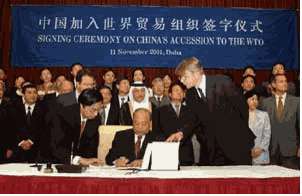
|
|
Chinese delegate signing China’s accession to the World Trade Organization.
(Source: http://www.ica.gov.cn/tpxw/20011113/2001111301.gif).
Internationally, China’s economy stands to gain from better access to foreign markets, for which it is the fifth largest exporter. On the domestic front, Chinese consumers are likely to see many more products entering local markets and at lower prices due to lower import tariffs and removal of state monopolies on highly protected sectors, such as banking and telecommunications. Accession to the WTO also may cause the enactment of reforms to China’s legal and administrative systems, making it more transparent and accountable in the implementation of laws.
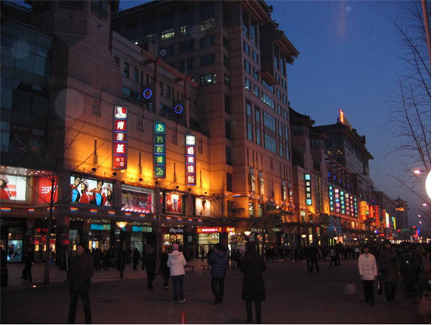
|
|
Xindong’an Market at Wangfujing shopping district in Beijing.
Shopping centers in urban China are increasingly integrated in the global trade.
Photo courtesy of Li Xu.
However, the potential cost for China’s concession is equally high. Reduced tariffs will expose many previously protected sectors to stiff foreign competition, leading to layoffs of millions of workers from inefficient state-run enterprises and farmers. This, in turn, may aggravate rural poverty. The resulting surge in unemployment, with minimal welfare and insurance benefits available, could spark a mass migration of jobless peasants to the big cities on the coast and spur social unrest.
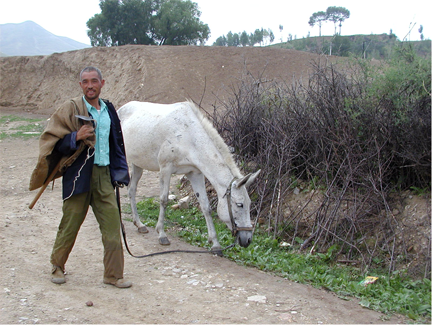
|
|
A villager at Hebei, China, whose life in rural China faces greater uncertainty
from China’s entry into the World Trade Organization.
Photo courtesy of Li Xu.
The government of China appears to be willing to accept the trade-off in its strategic move to solidify economic reforms and attract future investment. The treaty was ratified by the People’s Congress and put into effect in 2001. As a major importer and exporter of manufactured goods, China’s entry into the global trade body will very likely have a profound impact on the world economy. However, the longterm social and economic implications remain to be fully appreciated, as many changes are cushioned by the phase-in periods ranging from three to five years for different sectors. From a historical perspective, we can see that power relations between major states shape not only the content of international treaties but also the way they are fashioned and designed.
|
|